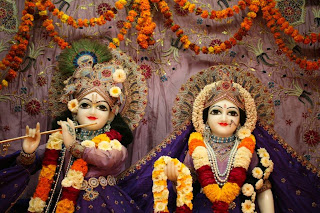
Well
it seems that Spring is almost here, saw the first Robin of the year,
have witnessed the blooming of the crocus and daffodils, and as the days
get longer and the nights stay warmer, I am reminded of the verse from
the Bhagavad-gita where Krishna says:
…and of seasons I am flower-bearing spring (Bhagavad-gita 10.35)
…Of
course spring is a season universally liked because it is neither too
hot nor too cold, and the flowers and trees blossom and flourish. In
spring there are also many ceremonies commemorating Kṛṣṇa’s pastimes;
therefore this is considered to be the most joyful of all seasons, and
it is the representative of the Supreme Lord Kṛṣṇa. (from purport to verse)
Full Text and Purport
Bhagavad-gita As It Is 1972 Edition
By His Divine Grace A.C. Bhaktivedanta Swami Prabhupada
Chapter 10, Text 35
The Opulence of the Absolute
bṛhat-sāma tathā sāmnāṁ
gāyatrī chandasām aham
māsānāṁ mārga-śīrṣo ‘ham
ṛtūnāṁ kusumākaraḥ
bṛhat-sāma—the
Bṛhat-sāma; tathā—also; sāmnām—of the Sāma-veda song; gāyatrī—the
Gāyatrī hymns; chandasām—of all poetry; aham—I am; māsānām—of months;
mārga-śīrṣo ‘ham—the month of November-December; aham—I am; ṛtūnām—of
all seasons; kusumākaraḥ—spring.
Of hymns I am the Bṛhat-sāma
sung to the Lord Indra, and of poetry I am the Gāyatrī verse, sung daily
by brāhmaṇas. Of months I am November and December, and of seasons I am
flower-bearing spring.
PURPORT
It has already been
explained by the Lord that amongst all the Vedas, the Sāma-veda is rich
with beautiful songs played by the various demigods.
One of these songs is the Bṛhat-sāma, which has an exquisite melody and is sung at midnight.
In
Sanskrit, there are definite rules that regulate poetry; rhyme and
meter are not written whimsically, as in much modern poetry. Amongst the
regulated poetry, the Gāyatrī mantra, which is chanted by the duly
qualified brāhmaṇas, is the most prominent. The Gāyatrī mantra is
mentioned in the Śrīmad-Bhāgavatam. Because the Gāyatrī mantra is
especially meant for God realization, it represents the Supreme Lord.
This mantra is meant for spiritually advanced people, and when one
attains success in chanting it, he can enter into the transcendental
position of the Lord. One must first acquire the qualities of the
perfectly situated person, the qualities of goodness according to the
laws of material nature, in order to chant the Gāyatrī mantra. The
Gāyatrī mantra is very important in Vedic civilization and is considered
to be the sound incarnation of Brahman. Brahmā is its initiator, and it
is passed down from him in disciplic succession.
The months of
November and December are considered the best of all months because in
India grains are collected from the fields at this time, and the people
become very happy.
Of course spring is a season universally liked
because it is neither too hot nor too cold, and the flowers and trees
blossom and flourish. In spring there are also many ceremonies
commemorating Kṛṣṇa’s pastimes; therefore this is considered to be the
most joyful of all seasons, and it is the representative of the Supreme
Lord Kṛṣṇa.


















